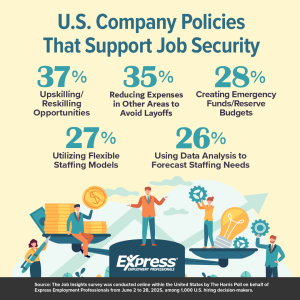A recent survey conducted by The Harris Poll on behalf of Express Employment Professionals highlights a growing disconnect in the US labor market: while most employers express confidence in their ability to maintain job stability, nearly half report that employee concerns about job security are increasing.
The findings, published in the September 10, 2025, edition of America Employed, reflect ongoing tensions in a labor market shaped by economic uncertainty, policy shifts, and evolving workplace expectations.
According to the survey, 84% of hiring managers believe their organizations can provide both short- and long-term job security. However, 46% say their employees are more concerned about job security now than they were a year ago.
This divergence suggests that employer optimism may not be translating into employee reassurance, particularly in sectors more vulnerable to external pressures.
The survey examined how companies communicate job security to their workforce. Among hiring managers, 46% said their organization uses an “all hands on deck” approach—defined as consistent and transparent communication from leadership regarding organizational stability. This method is more prevalent among white-collar employers (49%) than blue-collar ones (36%).
In contrast, 54% of blue-collar hiring managers reported using a “selective sharing” strategy, where information is disclosed only when deemed necessary. Only 34% of white-collar managers favored this approach.
From the employee perspective, 88% of job seekers indicated they would feel more secure working for a company that clearly communicates its plans. Yet only 33% said their current employer uses the “all hands on deck” method. Nearly half (49%) reported experiencing “selective sharing,” and 18% described their company’s communication style as “at arm’s length,” with leadership rarely sharing information.
Despite rising employee anxiety, employers are implementing various policies aimed at reinforcing job stability. According to the survey, 87% of hiring managers said their company uses specific practices to support job security, including:
- Upskilling and reskilling programs (37%)
- Cost-cutting in non-personnel areas to avoid layoffs (35%)
- Emergency funds or reserve budgets (28%)
- Flexible staffing models (27%)
- Data-driven forecasting of staffing needs (26%)
- Employer-funded education programs (25%)
These measures align with employee preferences. Job seekers cited the following as factors that would increase their confidence in long-term job security:
- Training for additional roles or responsibilities (41%)
- Clearer communication from senior leadership (41%)
- Access to cross-training or upskilling programs (38%)
External Factors Driving Stress
While internal policies may help mitigate job insecurity, external pressures continue to influence worker sentiment. Seventy-two percent of hiring managers said changes in government policies—such as tariffs, taxes, and regulations—have a greater long-term impact on job security than internal company decisions.
This concern is echoed in broader research. A recent Staffing Industry Analysts report found that 81% of US adults are worried about losing their jobs in 2025. Additionally, the American Psychological Association (APA) reported that 54% of employed adults say job insecurity significantly affects their stress levels at work. Forty-four percent expressed concern that an economic downturn could result in layoffs, furloughs, or job elimination within the next year.
The APA’s 2025 Work in America study also found that workers in organizations affected by recent government policy changes were more likely to report emotional exhaustion, disengagement, and difficulty focusing.
The Job Insights survey was conducted online in the United States by The Harris Poll for Express Employment Professionals between June 2 and June 28, 2025, with responses from 1,000 U.S. hiring decision-makers.
A separate Job Seeker Report was conducted from June 12 to June 27, 2025, also by The Harris Poll, surveying 1,000 US adults aged 18 and older.
Headline photo credit: geralt from Pixabay.





Facebook Comments